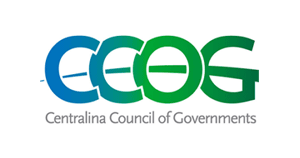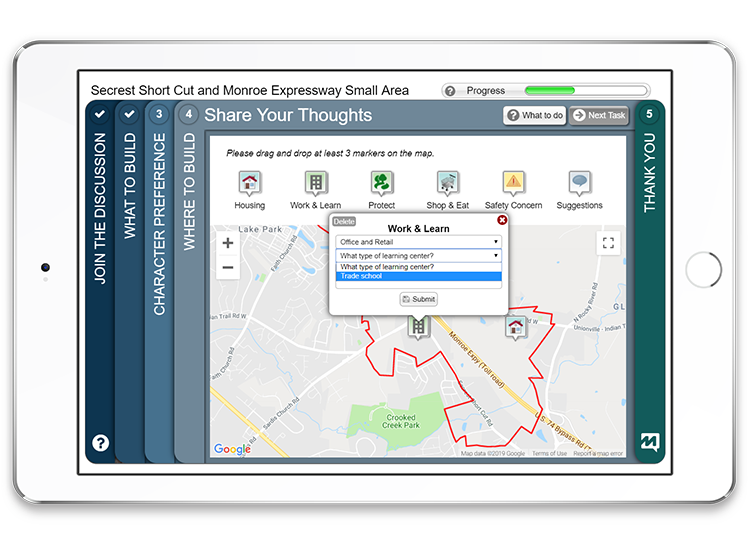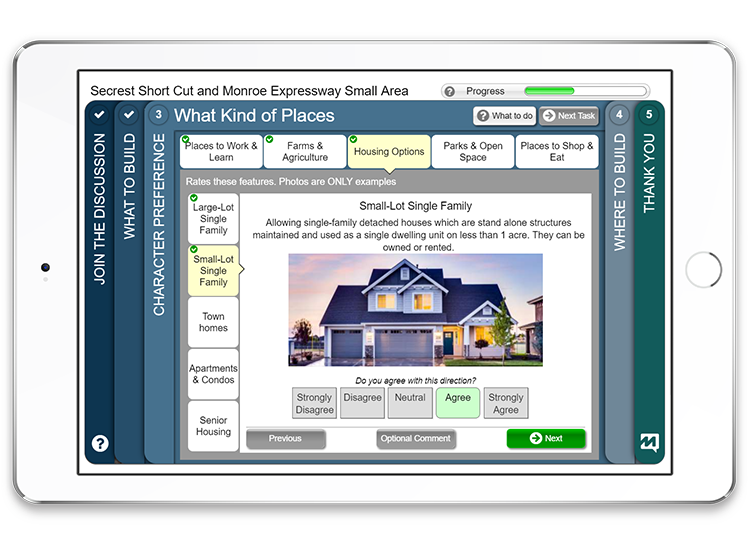Centralina COG engages over 8,350 residents!
“One of the most impressive things that we’ve found is the variety of screens that you can use, based on the types of projects that we do as a regional planning agency.” – Michelle Nance, AICP, Planning Director, CCOG
Congratulations on your robust online engagement for your regional plans!
MetroQuest has been a vital tool in the Centralina Council of Governments’ toolbox. Online engagement has helped local communities together to reach solutions and common ground on areas of shared interest. Metroquest has helped CCOG to:

About Centralina COG
The Centralina Council of Governments (CCOG) is a voluntary organization of municipal and county governments serving the Greater Charlotte region in North Carolina. One of 16 regional councils, CCOG is dedicated to finding innovative solutions to both existing and future challenges with a mission to unify the region’s collective resources to help grow the economy and jobs, improve the quality of life for residents, and control the cost of government.
CHALLENGE: Regional planning with meaningful community participation.
CCOG works at the regional and community levels to help local governments plan for and build places of lasting value. The agency sought to go beyond local businesses and organizations to involve residents in bringing communities together to reach solutions and common ground on issues of shared concern. Michelle Nance, AICP, Planning Director at Centralina Council of Governments commented,
“Before one of our major regional projects, we did a thorough analysis of multiple online engagement tools. What we liked about MetroQuest was its focus on community values.”
SOLUTION: Using MetroQuest to engage and survey communities!
CCOG subscribed to MetroQuest to create visual and interactive online surveys to engage various communities in the Greater Charlotte region on a variety of projects, from corridor studies to land use planning. With an annual subscription, the CCOG team can launch as many MetroQuest surveys as they need for one fixed annual price, helping reach a record-low cost-per-participant when compared to open house events.
“We truly enjoy the platform. In fact, one of the most impressive things that we’ve found is the variety of screens that you can use.”
Michelle described her requirements, “Based on the types of projects that we do as a regional planning agency, we needed something to be very versatile. We found the variety of MetroQuest screens to really meet our needs.”
Today, Michelle and her team bring MetroQuest surveys on iPads to open house events to focus visitors on local issues while capturing quantifiable feedback on planning options and priorities. “MetroQuest gives participants hands-on exercises,” said Michelle. She went on to explain that larger participation numbers have been reached with online promotions of the survey. “We’ve really had robust engagement online. That’s one of the reasons why we value MetroQuest so much.”
“As far as outcomes, through our regional planning process, being able to do scenario planning and connect the dots between people’s values and the types of land uses they thought were important was tremendous for our region.”
CCOG relies on MetroQuest to engage thousands of residents on planning projects across the region in communities of all sizes. Let’s explore one recent project.
1,800+ residents engaged in Northwest Huntersville transportation study.
The Town of Huntersville wanted public input on a transportation development that would see existing neighborhoods re-connected by large boulevards leading to North Carolina highways to support the fast-growing local population. “Existing residents were concerned about the changes to their self-contained neighborhoods and how the development would affect safety, property values, and their quality of life,” explained said Emily Parker, Senior Planner at CCOG.
They needed broad input from citizens to understand their desires and needs and to gain a deeper understanding of their priorities for development. Though the planning team recognized their focus would be on future roadways and pedestrian needs, they needed community-driven investment and direction to gain public support for these costly transportation projects.
While over 200 residents took the MetroQuest survey at open house events, the Town’s Public Information Officer used email and social media to achieve higher participation. “MetroQuest definitely expanded our capability to reach out to a broader audience and ensure that everybody in the study area had a chance for their voices to be heard. It provided people the opportunity to take the survey on their own time,” said Jessica Hill, AICP, Assistant Planning Director with CCOG. “People even used the open comment box to say ‘thank you’ for the opportunity to participate. They appreciated the online format and the interactivity of the survey.”
“We got rave reviews about MetroQuest. People really liked how it’s user-friendly, intuitive, and attractive. The participation online was pretty remarkable.”
In the first MetroQuest survey, the interactive Map Marker, Priority Ranking, and Tradeoff Screens helped uncover local issues, priorities, and ideas. Alternatives were developed based on this initial input and shared in a second MetroQuest survey, where residents rated scenarios.
In total, the team engaged 1,811 residents, collecting over 17,452 data points, with 5,463 map markers, and 753 comments for the Northwest Huntersville Transportation Study.
“The format, with the interactive map and open comment areas, provided people the opportunity to provide more feedback. With Survey Monkey, you can’t do any sort of mapping and you can’t do any visuals. So, I think the impact was significant,” shared Jessica. Emily described the flexibly that MetroQuest offers in terms of depth of engagement, “You can take the survey and be done in five minutes, or you can take time to fill out every comment. I think that flexibility is appealing to participants.”

APA WEBINAR WITH CCOG
Best in Show: Public Participation at APA NPC18
Did you miss some of the 34 fabulous sessions on public participation at APA's 2018 National Planning Conference in New Orleans? This fast paced 30-minute webinar features insights from three planning veterans freshly back from the conference.
RESULT: CCOG engaged over 8,350 residents in regional planning!
CCOG continues to use MetroQuest on planning projects across the region. Michelle described how online results have been used by the Charlotte Area Transit System for the LYNX System Update,
“We used MetroQuest to gain input on potential Rapid Transit Corridors. Because MetroQuest is such an easy platform to use, we actually got results from surrounding counties in the region, which has really changed the conversation.”
To date, CCOG has engaged over 8,350 residents, collected more than 91,950 data points, and captured 5,200 comments with MetroQuest to inform better planning across a variety of projects. Michelle shared the impact of taking public engagement to new heights,
“As a regional planning organization, we have many members. MetroQuest has been very versatile for us and helped our communities to grow and prosper.”
Her team explained why MetroQuest is such a vital tool in their public engagement toolbox. “In the planning department, we work with communities of all different sizes, types of character, with different budgets and issues. Having a tool as flexible as MetroQuest in our menu of engagement options is really valuable,” said Emily. Jessica went on to say, “The world of transportation is complicated. For the layperson, it’s hard to understand the terminology and processes involved. Having something as intuitive, attractive, and user-friendly as MetroQuest is helpful in gaining public understanding of what’s coming in their neighborhood. That’s really valuable.”
CCOG is one of hundreds of councils of government, regional planning agencies, metropolitan planning organizations, and departments of transportation to have launched MetroQuest surveys to maximize public participation, collect informed input, and deliver actionable results in support of better planning decisions. Congratulations to Michelle, Jessica, Emily, and the entire team at CCOG for your outstanding online public engagement results!

